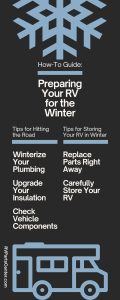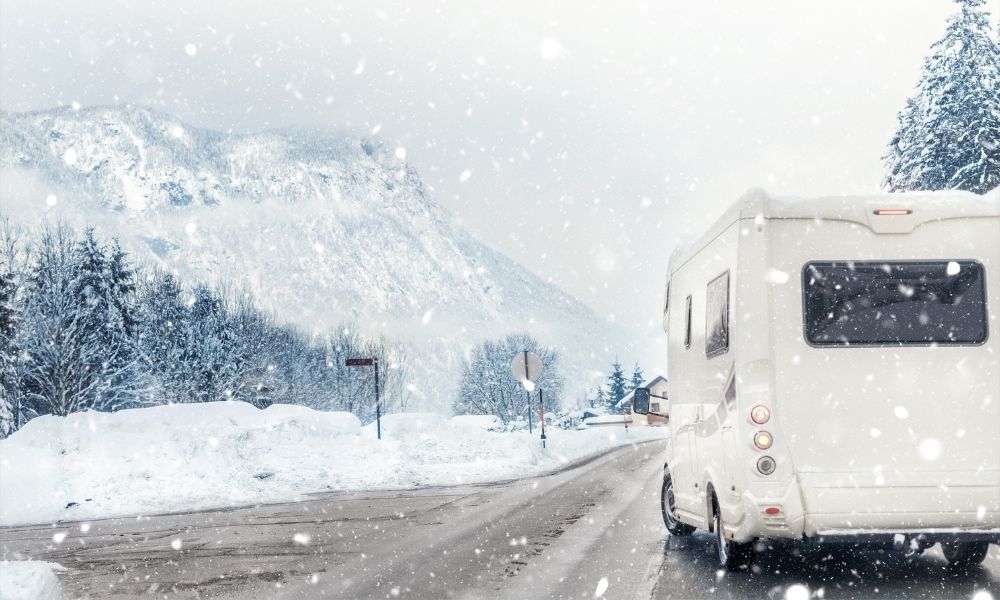Everyone needs to know how to winterize their mobile home. Most adventurers will agree that nothing beats the serene beauty of a winter wonderland while you’re camping. However, before deciding that this is a perfect idea, follow a few tips on preparing your RV for the winter. In this user-designed how-to guide, we’ll dive into what you need to know to ready your vehicle!
Tips for Hitting the Road
If you’re looking to enjoy the snow on your RV adventures this winter, you’ll need to keep your RV ready for the change in weather. So enjoy those winter sports and explore a landscape covered in sparkling snow!
When you’re hitting the road during the winter, keep a few things in mind. Most importantly, you should:
- Winterize your plumbing, or your pipes could freeze.
- Upgrade RV insulation; this keeps the RV toasty and comfortable.
- Check vehicle components, including your engine, battery, tires, and more.
Winter trips are exciting, and taking an RV makes it even more affordable for a family; however, you need to do a full vehicle check to remain safe. By adding each of these tasks to your checklist, you can hit the road without worry.
Winterize Your Plumbing
One of the first and most important steps to take is to winterize your RV plumbing. If you skip this, you risk the pipes freezing, which can cause all sorts of issues, including a lack of running water. To prevent this, experts recommend wrapping your water hoses in heat tape. As you do this, you can also place tape on connections and valves.
If you’re looking for other ways to protect your plumbing, keep cabinets open, as this allows for more airflow. Likewise, you could use a space heater to prevent the pipes from freezing—this also keeps travelers feeling nice and toasty!
Pro Tips
Experts recommend you use the internal freshwater tank as opposed to hooking up at campgrounds. And as far as your dump tank goes, only empty it when it’s full.
Upgrade Your Insulation
Insulation is great because it keeps the cool air out while trapping warm air inside. Check the seals along windows and doors to see if anything’s torn or otherwise broken. Out-of-shape weatherstripping will allow the cold air to seep in. You can also insulate the RV with window coverings or heavy drapes.
Foil-lined coverings help trap the heat, and thick drapes will do the same. While you go through and insulate your mobile home, add RV skirting to the vehicle’s exterior. This addition protects the bottom of your RV, as it helps to block snow and cold winds, which could impact components on the bottom of the RV.
Pro Tip
Keep a spare pair of gloves, a scarf, and other winter gear to keep warm in case you ever get trapped in a winter storm. Along with this, you should always have a shovel to prevent getting stuck in a snowdrift. If your mobile home sits in snow for too long, you risk your pipes freezing.
Check Vehicle Components
Take your RV into the shop so that an expert can look under the hood. In doing this, you’ll feel comfortable knowing that your engine, battery, and tires are all ready for the journey! Now is also the time to check fluid levels and refill anything that’s low.
While checking the RV battery, make sure it has a full charge so that it doesn’t die while you’re on your trip. Likewise, make sure the engine block heater works, as this prevents your engine from freezing in those chilly temperatures.
Pro Tip
Don’t neglect your tires; look over major vehicle components. When you’re driving through icy or snowy areas, you need snow tires or tire chains. Both of these help your RV gain traction as you navigate difficult terrain.
Tips To Traveling Safely
Once your RV is ready, you may want to consider packing a few extra items to keep all travelers nice and warm. The RV furnace will only do so much, and if you’re traveling far north, temperatures may be well below freezing.
Don’t risk safety or comfort levels; pack a portable heater, electric blankets, and clothing you can easily layer. Before going out for a hike or skiing adventure, layer your clothing to stay warm.
Pack the Right Gear
You need the appropriate gear for every trip you go on, regardless of the season. In winter, in particular, you’ll need:
- Flashlights
- Sleeping bags or blankets
- Winter clothing
A blow dryer is another vital item since it comes in handy if your pipes or hoses happen to freeze. Pack these items as you load up other essentials like food and bottled water so that you don’t forget anything. Nothing is tedious when it comes to safety.
Tips for Storing Your RV in Winter
Winter RV adventures aren’t for everyone, and that’s fine. If you’ve decided to move your mobile home into storage until spring, you’ve got a few tasks to tend to. You should:
- Empty and winterize all your water systems with RV antifreeze.
- Examine the exterior. Ensure no areas are damaged; if they are, then make repairs.
- Pick a location, and keep the RV parked somewhere safe.
Take your RV into the shop to check the battery, tires, and other essential components, just as you would if you were traveling. Doing this reduces the chances of finding something wrong with your mobile home in the spring.
Replace Parts Right Away
As you inspect your vehicle, you may notice broken or damaged parts. If so, make replacements. By waiting until spring to repair the RV, you risk things getting worse. RV Parts Center has you covered with all your must-have replacement pieces. Replace your leaky RV sinks and faucets or cracked side-view mirrors before winter compounds the issues.
Carefully Store Your RV
If you store your RV in a location other than your home, look at reviews for the storage facility. We’re talking about your home away from home. You don’t want to risk someone vandalizing or otherwise damaging it while it’s stored away.
Pro Tip
Remove all food and waste from the vehicle. You won’t be in there for a few months, and leaving these items increases the risk of a pest infestation. To further prevent the risk of pests, lay out traps as you ready the RV for storage.
Preparing your RV for the winter is necessary for all RVers. The way you go about winterizing your vehicle may change, depending on whether you plan to continue your adventures in a winter wonderland or wait out the cold weather. However, by taking care of your RV now, you can rest assured knowing that you’ll have plenty of adventures once spring comes!



